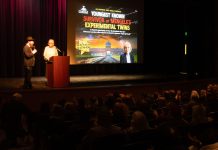Suit up, San Benito Trekkies. You’ll want to take a voyage to this meeting.
American linguist Marc Okrand will be part of a speaker series on the Amah-Mutsun Indian culture at the University of California, Santa Cruz, on Saturday. The series is called “From Mutsun to Klingon: How Helping Bring Back One Language Gave Rise to Another.”
“We do anticipate there will be a lot of people there who are fans of Klingons,” mused Valentin Lopez, chairman of the Amah-Mutsun Tribal Band, which is sponsoring the talk.
The Amah-Mutsun are historical residents of the Hollister, Gilroy, San Juan Bautista and Santa Cruz County areas, long before Spanish conquerors settled the region in the late 1700s. The federal Bureau of Indian Affairs is now considering a petition to offer federal recognition to the tribe, known as the “San Juan Band.” The last known speaker of the Mutsun language was a revered member of the tribe – Ascencion Solorsano de Cervantes – who revived its history and traditions in the 1930s.
“The language that was spoken (by the tribe) was the Mutsun language,” Lopez said.
The Mutsun language inspired the creation of the alien language “Klingon” in the “Star Trek” films, said Okrand in an interview from Washington, D.C. on Tuesday.
He studied the grammar of the Amah-Mutsun as part of his doctoral dissertation for the University of California, Berkeley, in 1977.
After he received his dissertation, he received a fellowship at the Smithsonian Institute in Washington, D.C. to further study old manuscripts of the Mutsun language. After that, he moved back out to California to do closed captioning work for television shows.
In 1982, he was in Los Angeles to do closed captioning work for the live broadcast of the Oscars that year when a friend invited him out to lunch at Paramount Studios, he said. The friend in question happened to be a secretary for “Star Trek” writer and producer Harve Bennett. The studio was working on “Star Trek II: The Wrath of Khan” at the time and needed help coming up with a new language, Vulcan, to speak by one of the most beloved characters in the Star Trek universe – Mr. Spock.
After Bennett discovered Okrand had studied linguistics, he was then hired by Paramount Pictures to develop the Vulcan language for a short scene in the movie.
“’We just solved the Vulcan problem,’” recalled Okrand as to what the producers said to him at the time.
After he spent a week helping to craft the language and coach the Vulcan actors, he moved on with other projects until producers of the next “Star Trek” film called him up and asked him to help with a new language they were developing for the bad guys of the “Star Trek” series – Klingons.
“I got a job creating Klingons,” he said, calling it an opportunity he could not turn down.
After that, Mr. Okrand has had a role in crafting Klingon language for every movie after “Star Trek II: The Wrath of Khan” – including the most recent blockbusters, “Star Trek” and “Star Trek Into Darkness.”
He said the Klingon language does not sound exactly how the Mutsun might sound because no one has spoken Mutsun since the 1930s. Still, he knows that because of his training in the language, some of Mutsun language crept into the Klingon dialect.
“There are little pieces that crept in there, but not in any way people would recognize,” he said. “It doesn’t sound like Mutsun at all except for a couple of sounds.”
Okrand said how he came to be the creator of the Klingon and Vulcan languages was a “fluke” that almost didn’t happen.
“I didn’t go there to invent the Vulcan language,” he said. “I went to eat a sandwich.”
Title: “From Mutsun to Klingon: How Helping Bring Back One Language Gave Rise to Another”
Date: Saturday, November 9th
Time: 2-4 p.m.
Where: University of California Santa Cruz campus, Humanities 1







